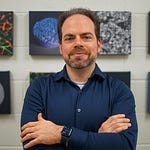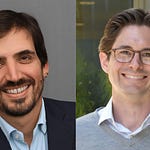Dr. Aaron Viny, oncologist and researcher at Columbia University, begins today’s conversation with a personal milestone—he’s now been leukemia-free for 21 years. This experience gives his work on cancer a powerful human dimension that comes through in his interview with Theral today—not only in his dedication to patient care, but in his boundary-pushing research on the epigenetic roots of cancer.
Dr. Viny’s research focuses on the epigenetic architecture of hematologic malignancies, exploring how errors in chromatin structure—not just mutations in DNA—can lead to cancer. “Cancer, at its root, is often a disease of dysregulated identity,” he says. “Cells that have lost their ability to regulate their own gene expression are primed for malignant transformation.” This breakdown in regulation becomes a doorway to cancer—a perspective that reshapes how we think about both origin and treatment.
Chapters:
0:00 Leukemia free for 21 years
5:25 Life as a researcher at Columbia University today
8:30 Epigenetics and cancer etiology
17:03 Impact of new spatial and single cell tech
25:00 What is hypomethylating treatment?
28:40 Using type and proximity of cell surface proteins to understand immune regulation
34:15 What next?
Dr. Viny discusses how emerging spatial and single-cell technologies are giving researchers a new kind of lens into these processes. The tools allow him and others to study not just what genes are expressed, but where in the tissue and in what context—something that’s proving crucial for understanding the complexity of the tumor microenvironment. He highlights the use of Pixelgen's platform for analyzing cell surface proteins, which offers fine-grained insights into how immune cells interact with cancer cells. “The type and proximity of cell surface proteins,” he notes, “tell us an entirely new story about immune regulation.”
He also speaks candidly about the realities of doing science today, especially within a strained academic system. Despite recent threats to research funding at Columbia, Dr. Viny remains resolute: “If we’re not investing in understanding cancer, what are we doing?”











